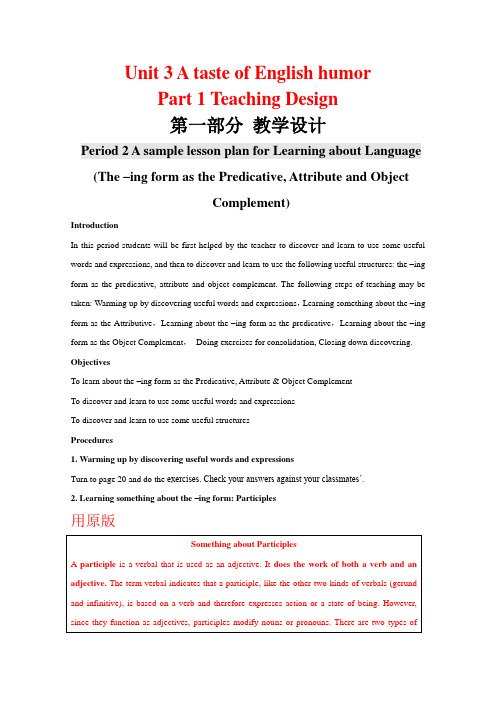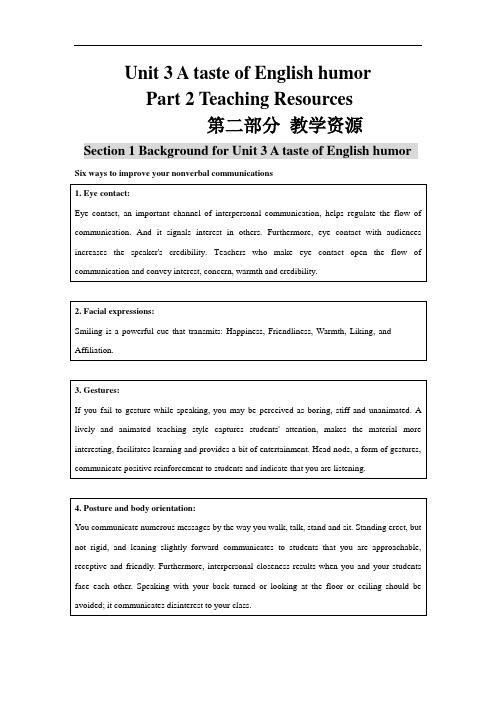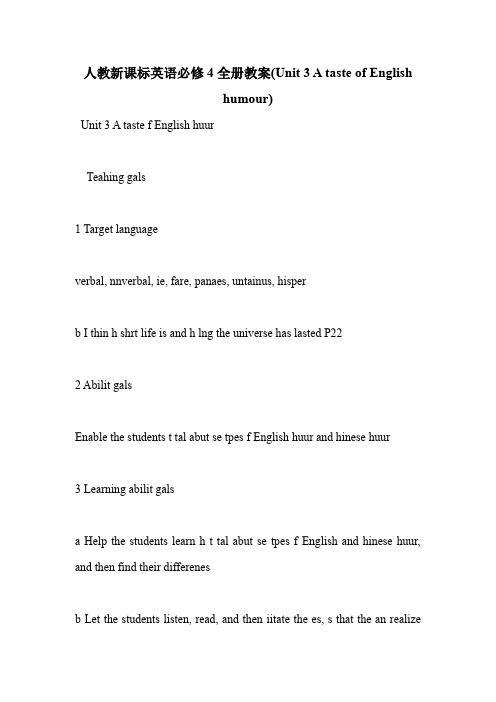2016新课标创新英语 人教版 必修四 Unit 3 Section 1
2015-2016年人教新课标高中英语必修四Unit3_全套课件

How many kinds of humor do you know?
sketch; cross talk
verbal
funny poems; funny stories;
jokes; limerick(打油诗) mime ; farce nonverbal clown
any mouse I like
She is good at Chinese Kongfu.
I want to lose my weight.
Riddle 谜语
1.What day of the week is the best for having fried foods?
2. What month do soldiers hate?
What is a punchline? Find the jokes’ punchlines.
POLICEMAN: Why did you have to break into the same shop three times? THIEF: Well, I stole a dress from that shop but my wife didn‘t like it. So I had to go back and change it twice!
mime
哑剧,滑稽剧
Do they have something in common ?
Chinese humorists
Two or more speakers make many jokes and funny conversae better:
verbal or nonverbal humour Give your reasons.
英语必修4人教新课标Unit3教案

Unit 3 A taste of English humorPart 1 Teaching Design第一部分教学设计Period 2 A sample lesson plan for Learning about Language (The –ing form as the Predicative, Attribute and ObjectComplement)IntroductionIn this period students will be first helped by the teacher to discover and learn to use some useful words and expressions, and then to discover and learn to use the following useful structures: the –ing form as the predicative, attribute and object complement. The following steps of teaching may be taken: Warming up by discovering useful words and expressions,Learning something about the –ing form as the Attributive,Learning about the –ing form as the predicative,Learning about the –ing form as the Object Complement,Doing exercises for consolidation, Closing down discovering. ObjectivesTo learn about the –ing form as the Predicative, Attribute & Object ComplementTo discover and learn to use some useful words and expressionsTo discover and learn to use some useful structuresProcedures1. Warming up by discovering useful words and expressionsTurn to page 20 and do the exercises. Check your answers against your classmates’.2. Learning something about the –ing form: Participles用原版Find the participial phrases in these sentences and tell what word they modify.1. The man running slowly still finished the race.2. The boy having been scolded finally did his work.3. The teacher, having retired, could now travel widely.4. The soldier, having saluted his superior, continued on his way.5. The truck swerving and sliding hit the brick wall.Keys:1. running slowly modifies man2. having been scolded modifies boy3. having retired modifies teacher4. having saluted his superior modifies soldier5. swerving and sliding modifies truck3. Doing exercises for consolidation4. Closing down by discoveringTo end the period you are going to skim the text and the previous texts to find out all the examples containing –ing forms used as the predicative, attributive and object.Unit 3 A taste of English humorPart 1 Teaching Design第一部分教学设计Period 3 A sample lesson plan for Using Language(English jokes)IntroductionLanguage is learned to be used in and for communication. So in this period we shall have the students read, listen, write and speak in English, making use of the focused words, expressions, structures and topic ideas covered in this unit. Warming up by reading school jokes comes first to be followed by reading and underlining and doing the exercises. Guided speaking and writing will lead to the end of the period: closing down by acting.ObjectivesTo enjoy reading the paragraph of Jokes about Sherlock Holmes and Doctor WatsonTo learn to use the language by reading, listening, speaking and writingProcedures1. Warming upWarming up by reading school jokesThere are lots of jokes in English about school life. Read one to see whether you will laugh or not. 用原版2. Reading and underliningRead the paragraph and underline all the useful expressions or collocations in it. Copy them into your notebook after class as homework.3. Doing the exerciseNow you are going to do the exercise 1 on page 22.4. Guided SpeakingThink of funny stories in English and tell them to your group mates.5. Guided Writing—Learn to write jokesThere are two main parts to the structure of a joke. The first part prepares you for the laugh by telling a story which creates a sense of expectation. The second part of the joke, the punch line, provokes laughter by telling an unexpected and different story, yet one which is still compatible with the first, as in this example: “My wife just ran off with my best friend. Boy, do I miss him.” and “I had a mud pack facial done, and for three days my face loo ked much better. Then the mud fell off.” Notice the assumption that is made in both these examples. In the first, you assume the person telling the story is angry with his wife, so the punch line surprises you because he's feeling something different and unexpected. Again, in the second example, you'd most likely assume the mud had been removed, leaving the face looking better, so the punch line takes you by surprise.So, to write jokes you need to practice reading statements and writing down the assumptions you make about them. You must be able to interpret the statement (first story line) in at least two different ways in order to provide the second, different story i.e. the punch line. And what to write about? Anything that interests you. Anything you have strong opinions about.Now write down your own jokes, in English.6. Closing down by actingActing out the text is a strategy for motivating us to read out loud the text. We need oral practice and help with pronunciation and so acting out the text really helps us.To end this period, we are going to act the film by Charlie Chaplin, The Great Dictator.。
人教版必修4 unit3 S1

5. Proximity: Cultural norms dictate a comfortable distance for interaction with students. You should look for signals of discomfort caused by invading students' space. Some of these are: Rocking, Leg swinging, Tapping, Gaze aversion.
6. Paralinguistics: This facet of nonverbal communication includes such vocal elements as: Tone, Pitch, Rhythm, Timbre, Loudnesr is often overlooked as a teaching tool, and it is too often not encouraged in college classrooms. Laughter releases stress and tension for both instructor and student. You should develop the ability to laugh at yourself and encourage students to do the same. It fosters a friendly classroom environment that facilitates learning.
2. Facial expressions: Smiling is a powerful cue that transmits: Happiness, Friendliness, Warmth, Liking, and Affiliation.
2016新课标三维英语 必修四 unit 1-S3

Section_ⅢGrammar—_主谓一致语法图解探究发现①Following Jane’s way of studying chimps, our group are all going to visit them in the forest.②Watching a family of chimps wake up is our first activity of the day.③Everybody sits and waits in the shade of the trees while the family begins to wake up and move off.④Jane warns us that our group is going to be very tired and dirty by the afternoon and she is right.⑤Ten hours has passed since I came here.[我的发现](1)句①中group强调成员,故其后谓语动词用复数形式;句③中的family和句④中的group强调整体,故其后谓语动词用单数形式。
(2)句②中的主语为动名词短语,故其谓语动词使用第三人称单数形式。
(3)表示时间、距离、金额、度量衡等名词作主语时,常表示一个整体概念,谓语动词用单数形式,如句⑤。
谓语动词与主语必须在人称和数上保持一致,这叫主谓一致。
主谓一致的应用主要有以下几种情况:一、名词作主语The public was kept in the dark about the matter.关于这件事情公众被蒙在鼓里。
The public now come to know the whole story.人们现在越来越清楚那是怎么回事了。
The football team is being rebuilt.(他们)正在重建这个足球队。
人教新课标英语必修4全册教案(Unit 3 A taste of English humour)

人教新课标英语必修4全册教案(Unit 3 A taste of Englishhumour)Unit 3 A taste f English huurTeahing gals1 Target languageverbal, nnverbal, ie, fare, panaes, untainus, hisperb I thin h shrt life is and h lng the universe has lasted P222 Abilit galsEnable the students t tal abut se tpes f English huur and hinese huur3 Learning abilit galsa Help the students learn h t tal abut se tpes f English and hinese huur, and then find their differenesb Let the students listen, read, and then iitate the es, s that the an realizethat huur is t let peple t be ptiisti abut everthing arundTeahing iprtant pintsHelp the students learn h t understand and en English hurs Teahing diffiult pintsHelp the students n the differenes beteen English and hinese in huurs Teahing ethdsUsing pitures, disussin, reading and iitatinTeahing aidsA rerder and a pretrPart ne: Teahing Design reading(NNVERBAL HUUR)AisT help students develp their reading abilitT help students learn abut English huurPreduresI aring uparing up b defining “Huur”hat is “Huur”? Des an ne f u n anthing abut huur? L at the sreen and read the definitin f Huur fr the Internethse b ?This is the str abut fur peple naed Everbd,Sebd, Anbd and NbdThere as an iprtant b t be dne,and Everbd as sure that Sebd uld d itAnbd uld have dne it, but Nbd did itSebd gt angr abut thatbeause it as Everbd&aute;s bEverbd thught Anbd uld d it,but Nbd realised that Everbd uldn&aute;t d itIt ended up that Everbd blaed Sebdhen Nbd did hat Anbd uld have dneII Pre-readingTelling the truth —h d u lie t laugh at?I lie t laugh at artns,fr the’re lvel and funI lie t laugh at fair tales The are ausing and interestingan ears ag there lived an Eperr h as s exeedingl fnd f fine ne lthes that he spent vast sus f ne n dress T hi lthes eant re than anthing else in the rld He t n interest in his ar, nr did he are t g t the theatre, r t drive abut in his state ah, unless it as t displa his ne lthes He had different rbes fr ever single hur f the daIII Reading1 Reading alud t the rerdingN please listen and read alud t the rerding f the text NNVERBAL HUUR Pa attentin t the prnuniatin f eah rd and the pauses beteen the thught grups I ill pla the tape tie and u shall read alud tie, t2 Reading and underliningNext u are t read and underline all the useful expressins r llatins in the passage p the t ur nteb after lass as her 3 Reading t identif the tpi sentene f eah paragrapSi the text and identif the tpi sentene f eah paragraph u a find it either atthe beginning, the iddle r the end f the paragraph 4 Reading and transferring infratinRead the text again t plete the tableNNVERBAL HUURhat is nnverbal huur?h is harlie haplin?H des he ae a sad situatin entertaining?hat is the str f The Gld Rush?Fats abut sarA brief life histr f harlie haplinReading and understanding diffiult sentenesAs u have read the text ties, u an surel tell hih sentenes are diffiult tunderstand N put ur questins nerning the diffiult pints t e the teaherIV lsing dnlsing dn b ding exerisesT end the lessn u are t d the prehending exerises N 1and 2 n pages 18 and 19 lsing dn b athing a silent vie b harlie haplinD u lie athing vies? D u lie huurus vies? N let’s ath a silent huurus vie b harlie haplin It’s harlie haplin’s first fil: aing a Livinglsing dn b reading abut harlie haplinT end the perid e shall read an artile abut harlie haplin N l at the sreen and read it alud ith eThe send perid Learning abut Language(The –ing fr as the Prediative, Attributive ≈ bet)AisT help students learn abut The –ing fr as the Prediative, Attributive ≈ bet)T help students disver and learn t use se useful rds and expressins T help students disver and learn t use se useful struturesPreduresI aring uparing up b disvering useful rds and expressinsTurn t page 19 and d exerises N 1, 2 , 3, 4 and he ur ansers against ur lassates’II Learning abut The –ing fr as the Attributive hat is attributive?It is sething plaed befre the nuns t be dified: “red” is an attributive adetive in “a red apple” “aling ” is als an attributive adetive in “a aling sti”III Read used aterials fr The –ing fr as the Prediative, Attributive ≈ bet hih verbs an be flled b the -ing fr?IV lsing dnlsing dn b disveringT end the perid u are ging t si the text and the previus texts t find ut all the exaples ntaining –ing frs used as the prediative, attributive and betlsing dn b exerisesIn the last fe inutes u are t d exerises 1, 2, 3 and 4 n page 21 he ur ansers against thse f ur grupates’The third perid Using Language(es abut Sherl Hles and Dtr atsn)AisT help students read the paragraph f es abut Sherl Hles and Dtr atsnT help students t use the language b reading, listening, speaing and riting PreduresI aring uparing up b reading shl esThere are lts f es in English abut shl life Read these t t see hether u illlaugh r nth ust e learn this? 为什么要学这个呀?ne da ur prfessr as disussing a partiularl pliated nept A pre-ed student rudel interrupted t as, “h d e have t learn this pintless infratin”“T save lives” the prfessr respnded quil and ntinued the letureA fe inutes later, the sae student spe up again “S h des phsis save lives?” he persisted”It eeps the ignrauses lie u ut f edial shl,” repli ed the prfessrII Guided reading1.Reading and translatingRead the paragraph n page 22 and translate it int hinese sentene b sentene2 Reading and underliningNext u are t read the paragph and underline all the useful expressins r llatins in it p the t ur nteb after lass as herllatins fr the paragraph n page 22G ap, in a untainus area, lie in the pen air, under the stars, l up at the stars, thin f…, tr a third tie, in ne’s beds3 Ding the exeriseN u are ging t d the exerise N 1 n page 22IIIGuided SpeaingThin f funn stries in English and telll the t ur grup atesIVGuided riting—Learn t rite esThere are t ain parts t the struture f a e The first prepares u fr the laugh b telling a str hih reates a sense f expetatin The send part f the e, the punh line, prves laughter b telling an unexpeted and different str, et ne hih is still patible ith the first, as in this exaple: “ ife ust ran ff ith best friend B, d I iss hi” and “I had a ud pa faial dne, and fr three das fae led uh better Then the ud fell ff” Ntie the assuptin that is ade in bth these exaples In the first, u assue the persn telling the str is angr ith his ife, s the punh line surprises u beause he’s feeling sething different and unexpeted Agai n, in the send exaple, u’d st liel assue the ud had been reved, leaving the fae ling better, s the punh line taes u b surpriseS, t rite es u need t pratie reading stateents and riting dn the asuptins u ae abut the u ust be able t interpret the stateent (first str line) in at least t different as in rder t prvide the send, different str ie the punh line And hat t rite abut? Anthing that interests u Anthing u have strng pinins abutN rite dn ur n es, in EnglishIV lsing dn b atingT end this perid, e are ging t at the fil b harlie haplin The Great Ditatr Part T Teahing Resures1.A text struture analsis f NNVERBAL HUURI Tpe f riting and suar f the ideaTpe f ritingThis is a piee f desribtive ritingain idea f the passageharlie haplin astnishes us ith the deep feelings he an inspire in us fr a harater he is plaingTpi sentene f 1st paragraphSe huur an be ruelTpi sentene f 2nd paragraphharlie haplin is suh an atr as t astnish us ith the deep feelingsTpi sentene f 3rd paragraphH did harlie haplin ae a sad situatin entertaining?Tpi sentene f 4th paragraphThe fil f The Gld Rush is set in alifrniaTpi sentene f th paragraphharlie haplin prdued, direted, and rte the vies he starred inII A tree diagra f the text harlie haplin — The Gld Rushharlie haplin aing a sad situatin entertaining?(para 3)The fil f The Gld Rush set in alifrnia here gld as disvered (para 4)Huurs being ruel(para 1)harlie haplin astnishing us ith the deep feelings(para 2)harlie haplin prduing, direting, and riting the vies he starred in (para )III A retld passage f the textGive A pssible versin:The furth perid ListeningStep 1 Listening n P23Listen t the tape and anser the flling questins1 hih is best title fr this str?2 h as ar Sith frustrated?3 hat turned the a int ine?4 Did u find this str funn? h?hat d u thin f hn’s behavir?Step 2 Listening textHand ut the listening aterial and listen t the tape ,then plete the passageStep 3 Listening n P1 Listen t the tape and ti the rds u hear2 Listen t the tape again and anser the flling questins1) here did Peter get the ptates?2) h didn’t Peter ant t get up hen the thief as in his huse?3 h uldn’t the thief tae aa the ptates?4 H did Peter stp the an stealing the ptates?Step 4 Listening textListen t the tape and plete the listening textThen as se students t read the passage ith the right ansers , and tell the ain ideaStep Listening tas n P81Listen t the tape and hse the best piture that best desribes hat happened2 hse the best anser t eah questin3 Listen t the tape again and anser the questinH d u thin the teaher felt hen he as ffered the dg?Step 6 DisussinDisuss h u uld slve these prbles and help the teaherStep 7 HerPlease llet as an funn stries as u an The ill be useful in the next perid And tr t find se interesting rds in these striesThe fifth perid Speaing and ritingStep 1 aring upL at the flling pitures abut huurThen as : H an inds f huur d u n? Step 2 En a edListen t the tape and finish the flling fr BrnDiedbAting tpeasterpiees Step 3ther exaples f English hur1 ie and fare r Bean2 funn striesar Tain : Life n the ississippi Adventures f Huleberr FinnAdventures f T SaerExaples f hinese huurfunn plasStep 41 Read se f these uster and aiter es and ath the e ith the explanatin n P22 2Sh re esStep HerPrevie the Reading aterial and finish the prehending ahead。
人教课标版 高一 必修 4Unit 3

2. The dog is thin and he feels sorry for it. 3. He asks what they intend to do with it. 4. He finds they all want to look after it
but only the person who tells the biggest lie can have it as a pet.
responsibility been doing in the kitchen.
3 He did not know the
chickens would get sick.
Listen to Part 2 and put these sentences in
order.
4 Mary got angry with John. 2 Mary saw the chickens behaving strangely. 5 John was sorry. 7 The chickens enjoyed the jam. 6 John said he thought the jam was porridge. 3 Mary looked at the red mess on the ground. 8 John said the chicken were drunk. 1 Mary came home.
1. Where did Peter get the potatoes? Peter was given the potatoes by a friend.
2. Why did he ask his wife to be quiet when she heard the thief? He thought the thief might have a knife and he did not want to make him angry.
2016新课标三维英语 必修四 unit 3-S3
Section_ⅢGrammar—动词-ing形式作表语、定语和宾语补足语语法图解探究发现①You may find it astonishing that Charlie was taught to sing ...②Such training was common in acting families at this time ...③He could mime and act the fool doing ordinary everyday tasks.④...his subtle acting made everything entertaining.⑤He grew more and more popular as his charming character, the little tramp, became known throughout the world.⑥How did the little tramp make a sad situation entertaining?⑦The acting is so convincing that it makes you believe that it is one of the best meals he has ever tasted动词-ing形式作表语的句子为⑦。
(2)动词-ing形式作定语的句子为②③⑤。
(3)动词-ing形式作补语的句子为①④⑥。
(4)比较句②和句③,可以看出单个现在分词作定语时要放在它所修饰的名词前面;现在分词短语作定语时要放在它所修饰的名词后面。
一、动词-ing形式作表语作表语的动词-ing形式包括现在分词和动名词。
1.现在分词作表语,往往具有形容词的性质,说明主语的性质、特征等。
作表语的现在分词,许多是由能够表示人们某种感情或情绪的动词变化而来的。
常见的有:moving, interesting, encouraging, exciting, inspiring, boring, surprising, puzzling, amusing, astonishing ...这类分词有“令人……的”的含义,常修饰物。
人教版高中英语必修四 Unit 3课件 (1)
In a word, you should develop a sense of humor and have a positive attitude towards life.
And finally look in the mirror and think “I’m beautiful”
Task Seven: Homework
3. Why was “The Little Tramp” loved by many people around the world?
A. Because he was a social failure. B. Because he wore strange clothes. C. Because he was poor and homeless. D. Because he was determined and
1. After class, please read the passage again and finish exercises in newspaper No 41--Reading tasks
2. Please read the passage again and finish exercises in “非常学案”page 34 “课文概述”
If you don’t feel content with your life, please……
…Don’t be afraid of others just because they are bigger than you. The real size could be measured in the wisdom.
Task One:
The Learning Aims:
人教版新课标英语必修四 Unit3 (18张PPT)
Speaking
1.Do you like the story? Why?
How wonderful! I’m pleased we both like… I felt happy because… What fun! It surprises me that… I (don’t) laugh at that kind of thing because… It is (not) very amusing/funny that… I (don’t) enjoy this very much because…
Module4 Unit 3 A taste of English Humour
Using language2
Jam
Listening
Read Exercise 3-5 and try to predict the story.
Listen to Part 1 and conclude the main idea.
She was going to put them in the fridge later when they had cooled down.
2. What did John think Mary should have done with the mess in the pan?
He thought she should have thrown it out for the chickens to eat.
What will Mary say when she finds out what has happened? How will John react to her?
Before you listen to Part 2, try to put these sentences in order.
人教版高一英语必修4 Unit 3 Section Ⅰ可编辑word文稿
Marx Brothers是美国早期著名的喜剧演员,他们热衷于塑造或癫狂或装傻充愣的人物,堪称无厘头的鼻祖。
Marx BrothersHarpo Marx, along with his brothers, grew up together in a very poor Jewish family in New York City.Though two of them knew some music, the Marxs never considered show business until their uncle made it big in vaudeville(杂耍).So their mother, Minnie, pushed them into forming an act which involved(使参与) Groucho as a boy singer, Chico on piano, and Harpo on harp(竖琴), with another of their brothers, Herbert Gummo, backing them up.Soon Gummo was replaced by Zeppo.Somehow or other, the Marx brothers’music gave way to comedy.Chico got laughs by pretending to be an Italian who couldn’t speak English very well, mixing up the meanings of words and phrases to great comic effect(喜剧效果).And Harpo, who had trouble saying lines and was no good at accents, got into thehabit of just not speaking at all.There’s no good way to really describe Harpo’s act;it’s kind of like watching a naughty three-year-old child in a man’s body during an extreme sugar rush.When vaudeville gave way to movies, the brothers became famous in the film world with their first picture The Cocoanuts in 1929, Animal Crackers 1930, Monkey Business 1931,Horse Feathers 1932, and Duck Soup in 1933.Their greatest movie A Night at the Opera in 1935 gave them a high and solid reputation that lasted for the rest of their lives.Though Groucho went on to become the most popular brother because of his early 60’s television show You Bet Your Life and some other projects, as a team they lived out their golden years performing together.So if you get a chance, don’t pass up the chance to catch a Marx brothers’movie: you’ll discover the “random(无厘头)” trend around every corner today is all their doing.Section ⅠWarming Up & Reading—Comprehending[基础词汇]1.ordinary adj. 平常的;普通的2.worn adj. 用旧的;用坏的;破烂的3.content adj. 满足的;满意的n. 满足v t. 使满足4.homeless adj. 无家的;无家可归的5.overcome v t.& v i. (overcame, overcome)战胜;克服6.outstanding adj. 突出的;杰出的;显著的[拓展词汇]7.humour n.幽默;滑稽→humorous adj.幽默的8.brighten v t.使更愉快;使更有希望→bright adj. 明亮的,鲜明的;聪明的;愉快的9.depressed adj.忧愁的;沮丧的→depressing adj. 压抑的;使人沮丧的→depression n. 沮丧;不景气;忧愁10.performer n.表演者;演出者→perform v.执行;表演→performance n. 执行;演出11.astonish v t.使惊诧→astonished adj.感到惊讶的→astonishing adj.令人感到惊讶的→astonishment n. 惊讶12.fortunate adj.幸运的;吉利的→fortune n. 运气,财富→fortunately ad v.幸运地→unfortunately ad v. (反义词)不幸地13.bored adj.厌烦的→boring......adj.无聊的;令人厌烦的14.entertain v t.& v i.使欢乐;款待→entertaining adj. 愉快的,有趣的→entertainment n. 娱乐15.failure n.失败(者)→fail v i. & v t.失败;不及格;使失望16.optimism n.乐观;乐观主义→optimistic adj.乐观的;乐观主义的17.enjoyment n.享受;欢乐;乐趣→enjoy v t.喜欢;欣赏→enjoyable adj. 令人愉快的18.convince v t.使信服→convinced adj. 坚信不移的→convincing adj.令人信服的19.direct v t.& v i.导演;指示;指挥adj. 直的;直接的;直率的→direction n. 指导→directly ad v. & conj. 直接地,径直地;一……就……20.confidence n.信心;信念→confident adj. 自信的;确信的1.up__to__now 直到现在2.feel/be__content__with 对……满足3.badly__off 穷的;缺少的4.pick__out 挑出;辨别出5.cut__off 切断;断绝6.star__in 在……担任主角;主演7.break__into 破门而入8.in__search__of 寻找1.as引导非限制性定语从句As__Victor__Hugo__once__said(正如维克多·雨果曾经说过),“Laughter is the sun that drives winter from the human face”,...2.with 复合结构Instead he and another man are hiding in a small hut during a snowstorm with__nothing__to__eat(没有任何东西可吃).3.as if引导方式状语从句Then he picks out the lace of the shoe and eats it as__if(好像) it were spaghetti.ⅠFast-readingSkim the text and choose the best answer.1.What’s the main idea of the text?A.How Chaplin entertained the audience with his humour.B.A brief introduction to Charlie Chaplin.C.One of Charlie Chaplin’s most famous films—The Gold Rush.D.The history of English humour.答案:B2.Match the main idea of each paragraph.Para.1A.An example of a sad situation that he made funny.Para.2 B.His achievements.Para.3 C.What Charlie’s childhood was like.Para.4 D.What his most famous character was like.Para.5 E.Why people needed cheering up.答案:ECDABⅡCareful-readingRead the text carefully and choose the best answer.1.How do you understand the sentence “Laughter is the sun that drives winter from the human face”?A.Laughter has the power to drive winter away and welcome warm spring.B.Laughter can keep one’s face warm, especially during freezing winter.C.Laughter can make people forget their problems and make them feel happy.D.Laughter can give people warmth, so their faces are not cold.2.Which of the following is NOT true according to the passage?A.Humour can make a sad situation entertaining.B.Charlie Chaplin was given an honour for his contribution to the film industry.C.Charlie Chaplin’s family became much poorer after his father died.D.Charlie Chaplin was not kind when others were unkind to him.3.What made Charlie Chaplin one of the most popular child actors in England?A.His appearance.B.His hairstyle.C.His humour. D.His foolish acting.4.What can we infer from the last paragraph?A.Charlie Chaplin was not only a writer and a director but also an actor and a film-maker.B.Chaplin was given a special Oscar for his outstanding work in films.C.In 1977 Charlie Chaplin died and was buried in Switzerland.D.Chaplin is loved and remembered as a great actor who could inspire people with great confidence.答案:1-4.CDCAⅢStudy-readingAnalyze the following difficult sentences in the text.1.As Victor Hugo once said,“Laughter is the sun that drives winter from the human face”,and up to now nobody has been able to do this better than Charlie Chaplin.本句中and连接两个________分句,as意为“正如”,引导________从句,先行词为整个主句。
- 1、下载文档前请自行甄别文档内容的完整性,平台不提供额外的编辑、内容补充、找答案等附加服务。
- 2、"仅部分预览"的文档,不可在线预览部分如存在完整性等问题,可反馈申请退款(可完整预览的文档不适用该条件!)。
- 3、如文档侵犯您的权益,请联系客服反馈,我们会尽快为您处理(人工客服工作时间:9:00-18:30)。
Ⅰ.Match the word with its meaning.1.humour A.having or bringing an advantage, an opportunity, a pieceof good luck2.content B.feeling tired and impatient because you have lost interest in sb./sth.3.astonish C.the ability to laugh at things that are amusing4.fortunate D.to successfully control a feeling or problem that prevents youfrom achieving something5.ordinary E.to interest and amuse sb.in order to please them6.bored F.excellent; extremely good7.entertain G.happy and satisfied with what you have8.outstanding H.to make sb.believe that sth.is true9.convince I.not unusual or different in any way10.overcome J.to surprise sb.very much答案:1~5CGJAI6~10BEFHDⅡ.Write down the meaning of phrases in each sentence.1.I have seen 5 movies directed by Charlie Chaplin up to now.到现在为止2.She looked at her newly-finished painting again and was content with herself.对……满意3.He has become quite badly off since he lost his job.穷困的4.I'm going to pick out a few books to send to some friends in West China.挑出5.He cut off a bunch of grapes to entertain us.剪下Do you know the following humorists and what they are famous for? Match them.A.Charlie Chaplin — comedy (喜剧)B.Mr.Bean — mime (哑剧)C.Sanmao — clown (小丑)D.Mark Twain — funny stories (幽默故事)E.Feng Gong — crosstalk (相声)答案:1~5BADCEⅠ.Fast reading1.Skim the passage to catch the main idea of the text.The text is about the life and work of Charlie Chaplin who brightened_the_lives of Americans and British through two world wars and the_hard_years_in_between.2.Find out the main idea of each paragraph.Para.1A.Why people needed cheering up.Para.2 B.Charlie's achievements.Para.3 C.What Charlie's childhood was like.Para.4 D.What his famous film character was like.Para.5 E.An example of his work.答案:Paras.1~5ACDEBⅡ.Careful readingChoose the best answer according to the passage.1.People enjoy seeing other people's bad luck because ________.A.they enjoy doing soB.it makes people more worried about their lifeC.it makes people more content with their lifeD.there's much fun in doing so2.Which of the following is NOT true about the description of Charlie Chaplin, as a tramp in the film?A.He wore large trousers, worn-out shoes.B.He was a poor, homeless man with a moustache.C.He walked around stiffly carrying a walking stick.D.He couldn't overcome difficulties with determination.3.In the end of the 19th century people went to Alaska to look for ________.A.films B.goldC.entertainment D.water4.Chaplin was given a special Oscar for ________.A.the characters he played in his filmsB.the films he directedC.the joy he gave us in his filmsD.the contributions he made in films5.From the text, we can know that ________.A.Victor Hugo had made friends with ChaplinB.many people went to California to become rich in the 1840sC.Charlie Chaplin had a happy life when he was youngD.when the little tramp chewed the shoe, he told the audience it was delicious答案:1~5CDBDDⅢ.Study readingAnalyze the following difficult sentences in the text.1.As Victor Hugo once said, “Laughter is the sun that drives winter from the human face”,and up to now nobody has been able to do this better than Charlie Chaplin.[句式分析]本句中and连接两个并列分句,as意为“正如”,引导非限制性定语从句,先行词为整个主句;that引导限制性定语从句,在从句中作主语。
[尝试翻译]正如维克多·雨果曾经说过,“笑声如驱走人们脸上寒冬的太阳”。
关于这一点,直到今天也没有人能比查理·卓别林做得更好。
2.Unfortunately his father died, leaving the family even worse off, so Charlie spent his childhood looking after his sick mother and his brother.[句式分析][尝试翻译]不幸的是他的父亲去世了,这使得他的家境更加贫寒,因此查理的童年是在照顾生病的母亲和弟弟中度过的。
3.The acting is so convincing that it makes you believe that it is one of the best meals he has ever tasted.[句式分析][尝试翻译]卓别林的表演是那么有说服力,以至于你会相信这顿饭是他所吃过的最美味的一顿!阅读理解AAbout the year 1990, a small, dark-haired hot boy named Charlie Chaplinwas often seen waiting outside the back entrance of London Theatre.Helooked thin and hungry.He was hoping to get work in show business.Hecould sing and dance; above all, he knew how to make people laugh.But hecouldn't get work and so he wandered about the city streets.Sometimes hewas sent away to a home for children who had no parents.But twenty years later this name Chaplin became the greatest, best-known,and best-loved comedian in the world.Any visitor to the cinema must have seen some of Chaplin's filmstrips (胶片).People everywhere have sat and laughed at them until the tears ran down their faces.Even people who don't understand English can enjoy Chaplin's films though most of them are silent.It isn't what he says that makes us laugh.His comedy doesn't depend upon words and languages.It depends upon little actions which mean the same thing to people all over the world.Acting out, without words, common human situations plays an important part in the dances and plays of many countries.It's a kind of world language.Chaplin lived most of his life in America and died in Switzerland on Christmas Day, 1977, at the age of eighty-eight.The world was astonished at the news of the death and burst into sadness.语篇解读:本文主要说明了卓别林作为滑稽演员的成就。
